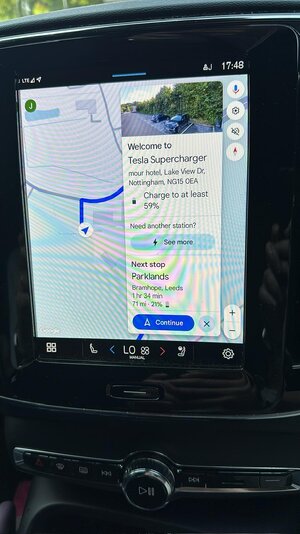- Jun 20, 2005
- 20,258
- 5,468
- 50,935
Yesterday my son drove his new Volvo XC40 all electric from near Cirencester to just south of Harrogate. The following is his assessment of the journey . The stop at Nottingham was circa 10 minutes.
The car decides how much charge it needs to complete the programmed journey apparently “smartly” allowing for your usage of power since start of the trip. Note he had the air con full on .
“It said 3% battery on arrival to the Tesla chargers. Got here with 15% battery! All about driving style! Had air con on the whole way. Car tells me to charge to 59% and that will get me home on 21%.”
How clever is that I thought? He rarely charges over 80% capacity. Takes ages to complete the last 20%.
I now understand there are chargers and there are chargers! He never uses motorway ones. Either broken, in use and very expensive. The Tesla network is favourite but does mean a few minutes detour.
Am I persuaded ? In part yes with quite a few riders.
My Treg will tow my TA from Lindisfarne to Wiltshire with full aircon without a refill and still 50 miles to spare. It has an onboard computer that tells me my current mpg , range in miles , etc.It’s still diesel for me but if I no longer caravanned and the prices were competitive who knows?
I suggest when everyone catches up with Tesla’s charging philosophy the attraction of EV will be greater.
I remain sceptical about all the Hybrids .But until every home is fitted with a decent fast charger the transition is likely to take a lot longer than many suggest. The current domestic 7kw chargers are really over nighters.
Overall , as a sceptic here in 2024 I’d say Volvo have done very well. Or is the aforethought of Tesla’s infrastructure the winner🤔
The car decides how much charge it needs to complete the programmed journey apparently “smartly” allowing for your usage of power since start of the trip. Note he had the air con full on .
“It said 3% battery on arrival to the Tesla chargers. Got here with 15% battery! All about driving style! Had air con on the whole way. Car tells me to charge to 59% and that will get me home on 21%.”
How clever is that I thought? He rarely charges over 80% capacity. Takes ages to complete the last 20%.
I now understand there are chargers and there are chargers! He never uses motorway ones. Either broken, in use and very expensive. The Tesla network is favourite but does mean a few minutes detour.
Am I persuaded ? In part yes with quite a few riders.
My Treg will tow my TA from Lindisfarne to Wiltshire with full aircon without a refill and still 50 miles to spare. It has an onboard computer that tells me my current mpg , range in miles , etc.It’s still diesel for me but if I no longer caravanned and the prices were competitive who knows?
I suggest when everyone catches up with Tesla’s charging philosophy the attraction of EV will be greater.
I remain sceptical about all the Hybrids .But until every home is fitted with a decent fast charger the transition is likely to take a lot longer than many suggest. The current domestic 7kw chargers are really over nighters.
Overall , as a sceptic here in 2024 I’d say Volvo have done very well. Or is the aforethought of Tesla’s infrastructure the winner🤔



